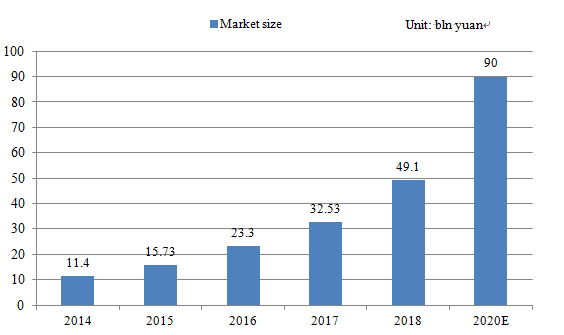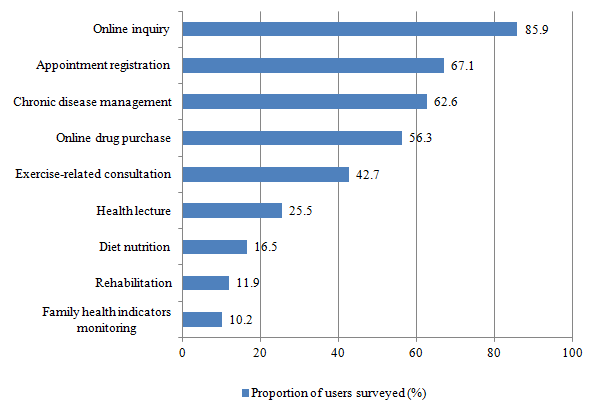
Visitors try an Internet-based healthcare service during an "Internet plus healthcare" exhibition of the fourth China-Arab States Expo in Yinchuan, northwest China's Ningxia Hui Autonomous Region, Sept. 6, 2019. (Xinhua/Li Mangmang)
BEIJING, Dec. 17(Xinhua) -- China's Internet plus healthcare industry has been developing rapidly driven by demands arising from the prevention and control of the COVID-19 pandemic, and the market size is expected to reach 90 billion yuan by the end of 2020.
As Internet plus healthcare services such as telemedicine, Internet-empowered diagnosis and treatment, and Internet hospital thrive, multinational pharmaceutical companies turn to seek digital transformation so as to seize the market opportunities.
A new era featuring the synergy between healthcare, pharmaceutical services, and medical insurance payment is foreseeable to come, following the country's policy to include Internet healthcare services in its medical insurance plan.
-- Expanding market
The sudden outbreak of the COVID-19 epidemic has largely changed healthcare service models. The difficulties in seeing doctors offline has led to wider use of the Internet by hospitals and doctors to fight against the epidemic. Internet plus healthcare may progress as a prevailing trend, although it is beyond imagination in the past, Dong Jiahong, chairman of the smart healthcare committee of the Chinese Medical Doctor Association said at the 2020 Smart Healthcare Forum.
According to data from AskCi.com, the market size of Internet plus healthcare in China is expected to reach 90 billion yuan in 2020, with user base approximating to 60 million.
Chart I: Market size of Internet plus healthcare in China (2014-2020E)

Data source: CN-Healthcare and AskCI
Internet-powered health services are playing an increasingly important role in China's health system. Since the outbreak of the COVID-19 epidemic, Chinese hospitals have rolled out a number of internet-based services, ranging from epidemic prevention knowledge sharing, health consultation, and disease treatment to drug delivery, Mao Qun'an, director of the planning, development and informatization department of the National Health Commission (NHC) told a press conference on October 8.
According to Mao, there have been 900 operational internet hospitals in China, and a remote medical collaboration network has been put in place covering more than 24,000 prefecture-based health institutions across the country.
Over one million Chinese doctors can provide online diagnosis service and more than 100 third-party healthcare platforms combined have recorded about one billion online user visits, Chen Baiping, partner and managing director of Boston Consulting Group, said on October 30.
Noting that China has the largest number of netizens in the world, Zhang Wenhong, director of infectious diseases department of Huashan Hospital affiliated to Fudan University said that in the future, where there is the Internet, there will be smart healthcare accessible for netizens.
-- Rapidly growing new formats
Internet plus healthcare propels the integration of the Internet with medical services, thus bringing new opportunities for the development of healthcare industry, Lu Qingjun, director of the National Telemedicine and Connected Health Center stated in an article published in November.
New forms of diagnosis and treatment services have emerged, including telemedicine, online diagnosis and treatment, and Internet hospitals, according to Lu.
For instance, in the first quarter, the online diagnosis and treatment volume of hospitals under the administration of the NHC increased 17 times year on year, and the diagnosis, treatment consultation volume of some third-party Internet service platforms rose 20-odd folds compared with the same period of 2019, according to the NHC.
In terms of settlement for Internet plus healthcare, online payment and one-stop settlement have been applied. To be more specific, after online diagnosis and treatment, patients can enjoy convenient services of making payment, having invoices issued and fees reimbursed via the Internet.
China attaches great importance to the development of new formats of Internet plus healthcare. On July 15, 13 departments including the National Development and Reform Commission, Cyberspace Administration of China, NHC, and National Healthcare Security Administration jointly issued guidelines on supporting the healthy development of new formats and new models of the sector.
The document emphasized the need to regulate and promote online follow-up treatment of chronic disease, telemedicine, and health-related online consultation. It called for further construction of smart hospitals, and encouraged the smart transformation and commercial model innovation in areas such as online purchase of medicines.
Survey on Chinese users' daily behavior related to Internet plus healthcare in 2020

Data source: iResearch
China's supporting measures incentivized multinational pharmaceutical companies to pursue digital transformation so as to seize the opportunities brought by new modes of online healthcare.
Asgar Rangoonwala, president of Xi'an-Janssen Pharmaceutical Co., Ltd. (Xi'an-Janssen), said in an interview with the 21st Century Business Herald that the company will continue increasing investment in digitalization and Internet-related businesses. By doing so, it aimed to promote programs that are designated to provide online consultation, online prescription, online nursing know-how promotion, online medicine purchase, and medicine delivery service for patients.
Although these services are common in the field of consumer goods, they are new for the pharmaceutical industry, added Asgar.
Regarding Internet hospitals, Asgar stated that China approved as many as 250 Internet hospitals from March to May. That was very exciting for his company as building a complete infrastructure by virtue of online platforms is highly consistent with its strategy. In September, Xi'an-Janssen signed a strategic memorandum with the First Affiliated Hospital of Xi'an Jiaotong University, vowing to jointly set up a Internet hospital and improve its communication, disease management and medical education capabilities through the cooperation.
In an interview with the 21st Century Business Herald, Qi Xin, vice president of GlaxoSmithKline, also talked about input in digitalization. She noted that considering patients' and doctors' embrace of telemedicine and other new Internet-based health services, the company is in cooperation negotiation with the Chinese Internet giant JD.com and trying to work with Internet medical companies in different fields.
-- Ushering in new era
To support innovation of online medical service modes, China made it clear that Internet plus medical services are covered in medical insurance payment scheme, according to the guidelines on promoting medical insurance payment for Internet plus medical services released on the official website of the National Healthcare Security Administration last month.
Following the move, a new era featuring the synergy between healthcare, pharmaceutical services, and medical insurance payment will come, reported Economic Information Daily in mid-November quoting industry insiders.
In the new era, Internet platform operators will explore approaches to cooperation to better serve individuals and give full play to their advantages related to pharmaceutical e-commerce, Internet hospitals, diagnosis and treatment platforms, and chronic disease management, said Lin Xiaowei, analyst with Everbright Securities.
The inclusion of internet plus healthcare services in the medical insurance system, coupled with the distribution of prescription drugs to patients outside hospitals and the enormous chronic disease market, are likely to bring immense development opportunities for China's Internet plus healthcare industry, according to Economic Information Daily.
The prospect of the Chinese Internet plus healthcare market is promising, with the market scale projected to increase from 218 billion yuan in 2019 to 1,129 billion yuan in 2024 and 4,223 billion yuan in 2030, according to Frost & Sullivan, a global market research and consulting firm. (Edited by Su Dan with Xinhua Silk Road, sudan@xinhua.org)




 A single purchase
A single purchase









